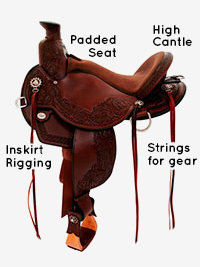 |
Trail and Pleasure
- Available in many varieties.
- Often built with a lightweight tree.
- Not designed for heavy ranch work.
- Designed with higher and lower cantle, lower cantle being more popular.
- Higher cantle: more protection.
- Lower cantle: more comfortable.
- Rigging is usually in-skirt because of the stress put on the saddle.
- Often equipped with many leather ties to attach your gear.
|
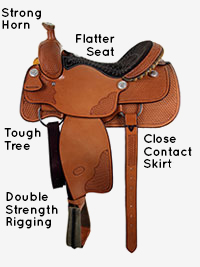 |
All-Around
- Flatter seat to allow movement and adjustment of rider.
- Seats are often padded suede.
- Often close contact skirting to help in the leg cues.
- Reinforced rigging for any type of light roping.
- Strong wooden tree.
- Strong horn, made higher for holding on to.
|
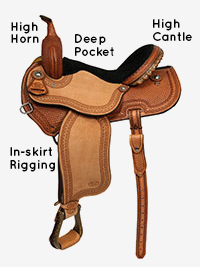 |
Barrel
- High cantle with deep pocket seat to hold you in.
- "Hip hugger" ridge around the back of the seat.
- High horn to hold on to.
- Shorter skirts.
- Rigging is simple in-skirt.
|
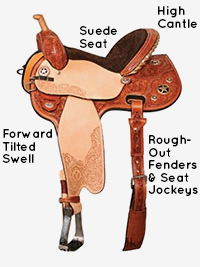 |
Mounted Shooting
- Forward tilted swell to give you more room to draw your guns.
- High cantle for extra security.
- Suede Seat to hold you in place.
- Roughout fenders and jockeys for extra stability.
- Light weight.
|
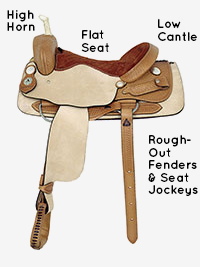 |
Cutting
- Low cantle, high pommel and horn.
- Flatter seat with slight rise at pommel.
- Jockeys and fenders often made out of rough out leather for better grip.
- Reinforced rigging.
- Back cinch and slim stirrups.
- Leather wear strap between fenders and bottom skirt.
|
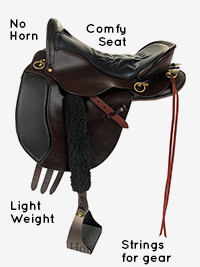 |
Endurance
- Very comfortable seat for long-endurance rides.
- Smaller, lightweight.
- Many strings for attaching gear.
- Most without horn.
- Often with center-fire rigging to keep saddle from tipping.
|
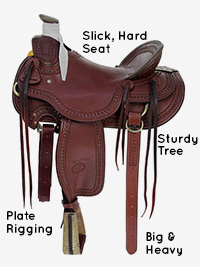 |
Ranch
- Big and heavy.
- Slick, hard seat for comfortable day-long use.
- Sturdy tree for rigorous ranch work.
- High cantles and back straps.
- Plate rigging, which is more comfortable for a horse that wears a saddle all day long.
|
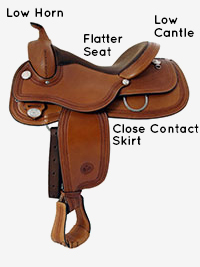 |
Reining
- Close-contact saddle with skirts to allow for rider-horse communication through cues.
- Lower horn and pommel for movement of reins without interference.
- Often with a show-type silver and patterns for the arena.
- Flatter seat for hip movement.
|
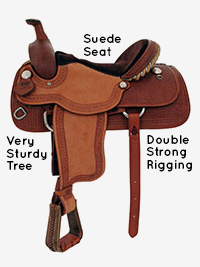 |
Roping
- Very sturdy wood tree with bullhide, rawhide, or very strong fiberglass covering.
- Reinforced rigging attached to tree and back strap expected.
- Seats often suede and padded, many times in a pocket seat for good positioning.
|
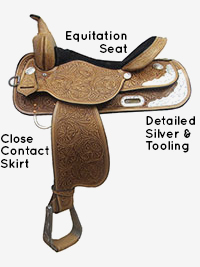 |
Show
- Very detailed tooling.
- Comes with silver on the skirts, cantle, pommel, horn, and stirrups.
- Seats are often equitation, which are balanced and have pocket to keep rider in the proper position.
- Turned stirrups.
- Padded suede seats.
- Often close contact with lower pommel and horn for better cues and rein control.
|
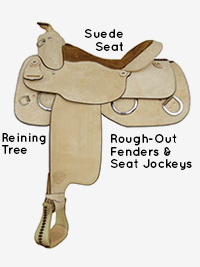 |
Training
- Often with reining saddle type tree.
- Low pommels and cut out skirts for closer contact.
- Many dees and rings to attach training devices or aids.
- Padded suede seats.
- Fenders and jockeys are rough out leather for better grip.
|